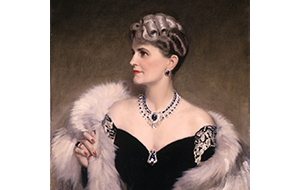
Washington--An exhibition of remarkable pieces made by Cartier for one of the brand’s most devoted clients is scheduled to open at the Hillwood Estate Museum and Gardens in Washington this summer.
The exhibition, called Cartier: Marjorie Merriweather Post’s Dazzling Gems, will be on view from June 7 to Dec. 31.
Marjorie Merriweather Post, who was born in 1887 and died in 1973, inherited the Postum Cereal Company at age 27 when her father died. The company later became General Foods Corp. She was a businesswoman and philanthropist, and was known for her extravagant and lavish tastes that included many homes and possessions.
Hillwood’s exhibition will offer perspective on the taste and refinement that characterized Post’s style, her criteria for collecting and her way of life.
Post began collecting Cartier pieces in the 1920s and remained one of the jewelry house’s most important clients for the rest of her life.
The pieces that will be shown at Hillwood represent some of the best examples of Cartier patronage in the 20th century. Included in the exhibition will be Cartier jewelry Post donated to the Smithsonian Institute in 1964, which are on loan for the display from the institute’s National Museum of Natural History.
“Marjorie didn’t just purchase jewelry off the shelf, she was a connoisseur who knew gems and chose only those of the highest quality. She recognized great design and knew how to wear her jewelry to show it to its best advantage,” said Hillwood Estate executive Kate Markert.
Jewelry highlights in the Hillwood exhibition include a 21-carat Colombian emerald once set in a ring worn by the former Mexican Emperor Maximilian I. The stone was remounted for Post into an Art Deco-style ring set with baguette diamonds.
A brooch featuring seven 17th century carved Mogul emeralds weighing a total of 250 carats will be displayed, as well as a necklace set with 24 baroque-cut emerald drops.
A diamond and sapphire necklace in the exhibition is an example of the transformations Cartier jewels often underwent over time in response to evolving tastes or owners, Hillwood said. The necklace’s centerpiece is a large cushion-shaped sapphire surrounded by cascading diamonds, which can be detached and worn separately as a brooch.
“Post’s interest in Cartier coincided with the very apex of its rise toward becoming one of the 20th century’s most distinguished jewelers,” said Liana Paredes, Hillwood Estate’s director of collections and exhibition curator. “The exhibition of Post’s most important Cartier acquisitions offers a snapshot of the very time at which Cartier in the 1920s boldly embraced the modern sensibilities of the Art Deco period and attracted the interest of the world’s most visible and fashionable clientele.”





